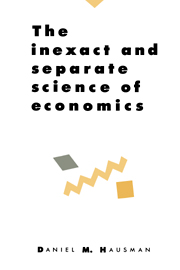14 - Economic methodology
Published online by Cambridge University Press: 04 August 2010
Summary
I have argued that the insistence that economic phenomena be treated by a single unified theory – equilibrium theory in particular – has no general justification. Whether equilibrium theory is the best way to proceed is an empirical question; and there is little reason to reject other approaches because they cannot be integrated into a unified theory of an economic realm. But in reaching this, my principal critical conclusion, I have not yet addressed two powerful arguments that apparently establish the permanent hegemony of equilibrium theory. And, even if these arguments can be answered, I have said little about the upshot of my philosophizing for the practice of economics. Finally, even if I can defend the claim that equilibrium theory has no methodologically privileged position and show what the implications are for the practice of economics, one might reasonably question whether an outsider could challenge the methodological practice of an established discipline such as economics. Is not such a challenge futile and arrogant? What possible authority could I have to preach to economists?
The hegemony of equilibrium theory
Suppose a theorist were to offer a maverick explanation of some economic phenomenon P, which employed “ad hoc” behavioral generalizations that violate the strictures of section 6.5. In assessing this explanation relative to equilibrium theory, there are three possible cases: (1) there is a competing explanation of the phenomenon P in terms of equilibrium theory and permissible additions; (2) equilibrium theory does not appear to have any relevance to P at all; and (3) P is anomalous from the perspective of equilibrium theory, which apparently implies that the phenomenon ought not to occur.
- Type
- Chapter
- Information
- The Inexact and Separate Science of Economics , pp. 247 - 269Publisher: Cambridge University PressPrint publication year: 1992



